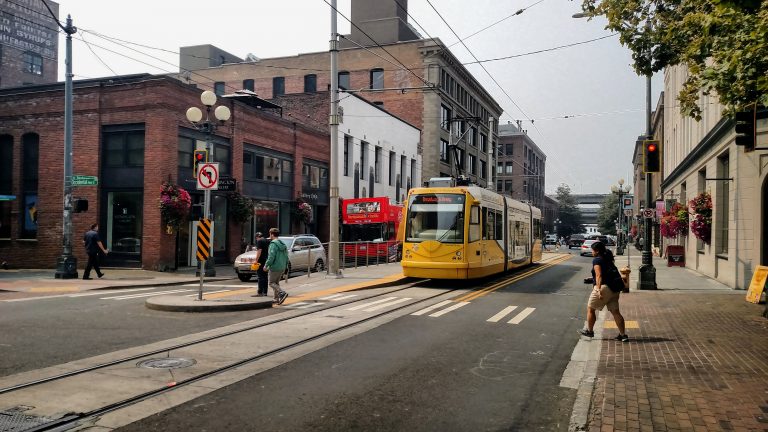There's an alarming transit drama playing out right now in Seattle.
New Mayor Jenny Durkan is considering killing a nearly shovel-ready transit project that many experts think is critical for the city's continued progress in boosting transit ridership.
Durkan has singled out the Center City Connector, a 15-block streetcar project, for possible cancellation. The project was planned to connect two short existing streetcar routes: the First Hill and South Lake Union streetcars. Neither line has had stellar ridership, but a third line that connects them is expected to greatly improve the usefulness of the system and boost ridership considerably.
Seattle is one of the few cities in the country that has grown transit ridership, and reduced solo car commuting, even as the economy has rebounded and gas prices have been low. And Seattle residents are invested. The region passed a $50 billion transit measure in 2016 that will add 62 miles to its light rail system.
Part of the reason Seattle has been so successful at managing the cars coming into its center city is necessity. The downtown has added more than 45,000 jobs in the last seven years. And the streets are near capacity.
That's one way the Center City Connector can help, supporters say. It can move more people through the crowded space than cars.
There have been some high-profile streetcar projects in other cities — hello, Atlanta! — have not lived up to expectations. But the Center City Streetcar avoids some of the pitfalls of those lines: it will run on dedicated lanes in the center of the street, will add to a larger 3.8-mile network and will run every five minutes.
But Durkan has said she's looking at a bus route instead — though that could squander $90 million that's already been committed to the project.
The saga goes back to March, when a $23-million shortfall was discovered, and Durkan halted the project and hired the accounting firm KPMG to evaluate the project. The results of the KPMG review were dropped late Friday — a sign, some have said, that the mayor was trying to bury the result.
And here's why: Yes, costs had jumped by $50 million, bringing the project to an estimated $252 million on the high end. But the firm largely agreed that the full line would be well used, with 18,700 to 22,000 daily weekday passengers. Urbanist reports that KPMG predicts the line could even be operationally profitable once it opens, something that is very unusual for American transit lines, which almost all rely on an operating subsidy.
Durkan hasn't made a final decision yet about the project. A spokesman told Curbed that the mayor will consider the project from a number of angles over the next few weeks. Meanwhile, delays are adding to projects costs. Seattle Transit Blog says foot-dragging as contributed an estimated $8 million to the project's costs.
Too much delay may even threaten the project altogether. Under President Trump, the U.S. DOT has slowed the process of releasing federal funds practically to a halt. There's no guarantee that if the project was restarted again from the planning phase, federal support would be forthcoming.
Durkan's hostility to the project seems to go past just fiscal concerns. Earlier this summer she made a misleading claim — nevertheless parroted by the media — that the trains chosen for the project would not fit the tracks.
And some of her other early moves as mayor have been disappointing from a transit perspective. She appears, for example, to have put the kibosh on an exciting public-private partnership that would have helped improve bus stops, using ad revenue.






